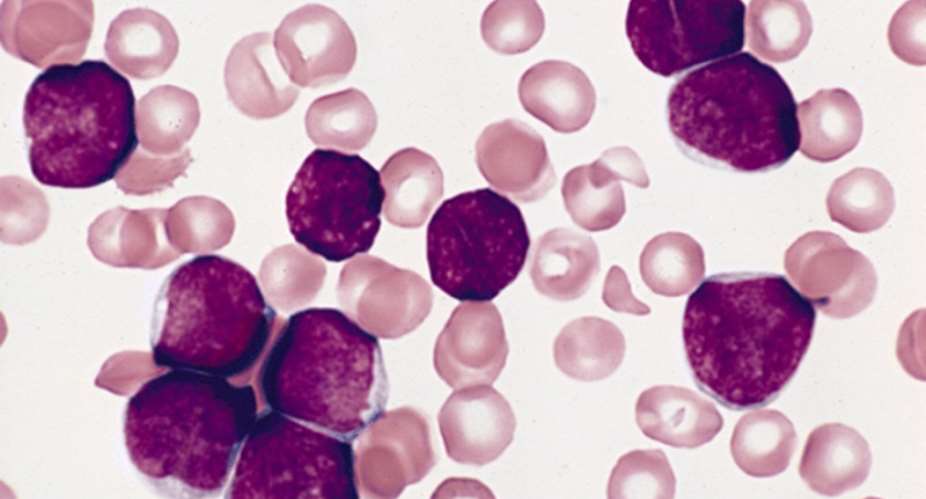DEFINITION
Leukemia is a Cancer of blood forming tissues including bone marrow and the lymphatic system.This type of cancer hinders the body's ability to fight infection, leukemia involves the white blood cells.
CAUSES OF LEUKEMIA
Leukemia can develop due to a problem with blood cell production.
Several factors have been identified which increase the risk of having the cancer:
•A family history of leukemia
•Smoking
•Genetic disorder such as Down syndrome
•Exposure to chemicals such as benzene
•Exposure to high levels of radiation
TYPES OF LEUKEMIA
Leukemia can be Acute or Chronic. In Acute leukemia, Cancer cell multiply quickly while in Chronic leukemia, the disease progresses slowly and early symptoms may be very mild.
Leukemia can also be classified according to types of cells which are myelogenous leukemia and lymphotic leukemia involving myeloid cells and lymphocytes respectively.
SYMPTOMS OF LEUKEMIA
•Excessive sweating most especially in the night
•Fatigue and weakness
•Unintentional weight loss
•Fever or chills
•Frequent infections
•Bleeding easily and bruising easily
•Enlargement of the liver or spleen
LEUKEMIA IN PREGNANCY
Leukemia affects approximately 1 in 10000 pregnancies.Women with leukemia have non-specific symptoms and some of them could also be attributed to pregnancy.
The damage in the fetus is correlated with the time of exposition and the fetus is most vulnerable during organnogenesis phase, Although chemotherapy has effect in the fetus, there are reports of cases with successful pregnancy.
It is necessary to study the relation among chemotherapy, the leukemia and the fetus in long term studies where fetus has been exposed to chemotherapy agents and is reported with normal characteristics at birth.
ENZYMES DEFICIENT IN LEUKEMIA
Blast cells from 100 cases of Acute leukemia were evaluated for the presence of methylthioadenosine phosphorylase (MTAase), an enzyme important in polyamine metabolism.
Ten cases (10%) had undetectable levels of MTAase activity. A relatively high frequency (38%) of MTAase deficiency was seen in all of T-cell origin.
MTAase deficiency occurs in a wide variety of acute leukemia, that the lack of enzyme activity is specific in malignant cells. The absence of MTAase in some leukemia may be therapeutically exploitable.
TREATMENT OF LEUKEMIA
Leukemia is usually treated by a hematologist-oncologist. These are doctors who specialize in blood disorders and cancer.
The treatment depends on the type and stage of the cancer, the treatment includes the following:
•Chemotherapy uses drugs to kill leukemia cells.
•Radiation therapy uses high energy radiation to damage leukemia cells and inhibit their growth.
•Stem cell transplantation replaces diseased bone marrow with healthy bone marrow.
•Biological or immune therapy uses treatments that help your immune system recognize and attack cancer cells.
•Targeted therapy uses medication advantages of vulnerabilities in cancer cells.





 We’ll protect state wealth from opaque deals – Prof Jane Naana
We’ll protect state wealth from opaque deals – Prof Jane Naana
 Mauritania president says running for second term in June polls
Mauritania president says running for second term in June polls
 I won't ever say I was a mere driver’s mate' — Prof. Opoku-Agyemang
I won't ever say I was a mere driver’s mate' — Prof. Opoku-Agyemang
 2024 polls: 'EC struggling to defend credibility'— Prof. Opoku-Agyemang
2024 polls: 'EC struggling to defend credibility'— Prof. Opoku-Agyemang
 Akufo-Addo gov't's 'greed, unbridled arrogance, unrestrained impunity, sheer dis...
Akufo-Addo gov't's 'greed, unbridled arrogance, unrestrained impunity, sheer dis...
 Election 2024: Ghana needs an urgent reset, a leadership that is inspiring – Ma...
Election 2024: Ghana needs an urgent reset, a leadership that is inspiring – Ma...
 Partner NDC to rollout a future of limitless prospects – Prof Jane Naana Opoku-A...
Partner NDC to rollout a future of limitless prospects – Prof Jane Naana Opoku-A...
 NPP will remain in gov’t till Jesus comes — Diana Asamoah
NPP will remain in gov’t till Jesus comes — Diana Asamoah
 Sunyani Technical University demands apology from former SRC president over sex-...
Sunyani Technical University demands apology from former SRC president over sex-...
 'Dumsor' was resolved by Mahama but ‘incompetent' Akufo-Addo has destroyed the g...
'Dumsor' was resolved by Mahama but ‘incompetent' Akufo-Addo has destroyed the g...
